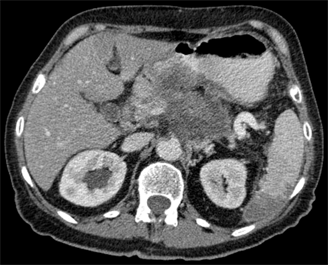Ruxolitinib May Boost Survival in Pancreatic Cancer
The JAK inhibitor ruxolitinib may improve overall survival in patients with metastatic pancreatic cancer characterized by an elevated CRP, a well-established marker of inflammation.
Pancreatic cancer in CT; source: Hellerhoff, Wikimedia Commons

The JAK inhibitor ruxolitinib may improve overall survival in patients with metastatic pancreatic cancer characterized by an elevated C-reactive protein (CRP), a well-established marker of inflammation.
Data from a phase II study of ruxolitinib or placebo with capecitabine, also known as the RECAP study (abstract 4000), were presented by Herbert Hurwitz, MD, of the Duke University Medical Center in Durham, North Carolina, at the 2014 American Society of Clinical Oncology (ASCO) Annual Meeting, held May 30–June 3 in Chicago.
“These data support the role of inflammation in cancer and the JAK-STAT pathway as a novel and clinically important therapeutic target in metastatic pancreatic cancer,” Hurwitz said.
The majority of patients with pancreatic cancer have evidence of systemic inflammation manifested by elevated levels of multiple cytokines. Ruxolitinib is a JAK1/2 inhibitor that blocks signaling mediated by multiple inflammatory cytokines. Elevated levels of cytokines are often a marker of systemic inflammation present in a majority of patients with pancreatic cancer.
“Previous reports in preclinical models of pancreatic cancer have shown that ruxolitinib demonstrated antitumor activity in combination with capecitabine in xenograft models of pancreatic cancer,” Hurwitz said.
In this study, patients with histologically confirmed metastatic pancreatic cancer were randomly assigned to ruxolitinib/capecitabine (n = 64) or placebo/capecitabine (n = 63). The patients had a median age of about 67 years.
Results of the primary endpoint analysis showed that patients assigned to ruxolitinib/capecitabine had a median overall survival of 136.5 days compared with 129.5 days for patients assigned placebo/capecitabine (hazard ratio [HR] = 0.79; 95% confidence interval [CI], 0.53–1.18; P = .25).
Subgroup analyses looking at systemic inflammation markers showed that CRP had a high level of predictive importance in this patient population. Patients with a CRP greater than 13 mg/L who were assigned to ruxolitinib/capecitabine had a median overall survival of 83 days compared with 55 days for the placebo group (HR = 0.47; 95% CI, 0.26–0.85; P = .01).
The researchers also performed a preplanned analysis to see if baseline characteristics of patients with a high CRP affected the overall survival results. After adjusting for age, lactate dehydrogenase, albumin, liver and lung metastases, performance status, sex, and prior treatments, the HR remained 0.50 (95% CI, 0.26–0.96).
Next, the researchers conducted an analysis of overall survival using the modified Glasgow Prognostic Score (mGPS), a clinical measure of inflammation in cancer that has been shown to have independent prognostic value. Patients with a CRP of 10 mg/L or less have an mGPS score of 0; a CRP of 10 mg/L or more and albumin of 35 g/L or more, an mGPS of 1; and CRP of 10 mg/L or more and albumin of less than 35 g/L, an mGPS of 2.
Patients with an mGPS of 1 or 2 who were assigned ruxolitinib, indicating a CRP of more than 10 mg/L, had a significantly improved overall survival compared with patients assigned to placebo (HR = 0.60; 95% CI, 0.35–1.03). In comparing the patients with an mGPS of 1 or 2 distinguishing by albumin levels, patients with an mGPS of 2 assigned ruxolitinib had a significantly improved overall survival compared with placebo (HR = 0.49; 95% CI, 0.23–1.07), but no significant advantage was seen in patients with an mGPS of 1.
No significant difference was found between the groups for progression-free survival, even when patients with elevated CRP were examined. Overall, ruxolitinib was well tolerated.
“Phase III programs in pancreatic cancer have been initiated, and exploratory phase II studies have been initiated in other diseases showing signs of onco-inflammation,” Hurwitz said.
Newsletter
Stay up to date on recent advances in the multidisciplinary approach to cancer.